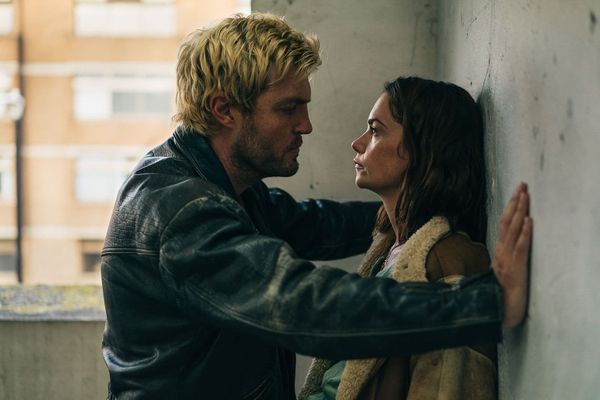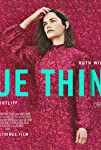Eye For Film >> Movies >> True Things (2021) Film Review
True Things
Reviewed by: Jennie Kermode

“You know you could get fired for having a relationship with a client,” Kate (Ruth Wilson) is warned. She certainly ought to know. She works in a DWP office, dealing with sensitive personal information in a capacity which could also put her at risk of accusations of fraud. But it’s one of those grim, unforgiving jobs where, day in and day out, she is exposed to other people’s misery in a way that eats away at her soul. Outside of work, she has few friends. She’s not on good terms with her mother. She doesn’t seem to value herself very much, so when a charismatic client (Tom Burke) takes an interest in her and is very forward about it, she goes along with him. He’s confident and impulsive. She seems to be getting a taste of freedom for the first time.
They fuck in a corner of a multi-storey car park. She’s not that kind of girl, and that’s why it’s so overwhelming – she’s not only breaking the rules but is stepping out of her constrained life into a whole new way of living. The scene is not visually explicit. Director Harry Wootliff, whose previous feature, Only You, also focused on an intense romantic relationship, keeps the camera focused on Kate’s expression, on her experience. This also serves a reminder that the experience – and the film – are about Kate. Kate’s mistake is to think that they are about the man.

She doesn’t get his name. She calls him Blond. Later, at a drugged-up party, she will wander around helplessly asking people “Have you seen a man with blond hair?” It’s just a drink or two that they share at first, and a spliff, feeling a little bit dangerous. Then it’s ketamine. Kate hasn’t had the best record for timeliness at work but now she struggles to make it there at all. Her life goes off the rails with astonishing speed. The only thing she knows she wants is him. “You know he’s using you,” warns her friend Alison (Hayley Squires), but she doesn’t care. She can’t see what is transparent to anybody else who cares to look: that he’s a juvenile, exploitative, self-centred twat.
Shot in square format, the film keeps us close, closed-in, forcing viewers into the same overwhelming intimacy that Kate is experiencing. The visuals blur when she’s drugged or drunk (and, all too often, driving in that state). When it rains, water collects on the camera lens. Everything is immediate, life in the moment.
“I used to have an imaginary friend. A horse called Dunlop,” says Kate, trying to share something meaningful, and one wonders for a moment if she’s imagining Blond. She certainly projects a lot onto him. In the meantime, though, she’s changing, regaining some primal quality which has been stripped away from her over the years. In a dream, she gets up close to a fierce-looking dog. In her kitchen, she tears up pieces of meat with her hands.
Wootliff plays with the language of romantic comedies. Trying, briefly, to take Alison’s advice, Kate goes on a hilariously inappropriate date. Later, w3hen he thinks he understands her, Blond steals lines from romcoms, and it seems less and less funny.
A raw, visceral portrayal of one woman’s journey into something which might be madness and might be a first step towards liberation, True Things is one of those films which grabs hold of the viewer and refuses to let go. Like Blond, it’s tremendously assured and dazzling, but unlike him, it has real substance. Wootliff is a force to be reckoned with.
Reviewed on: 07 Mar 2022















